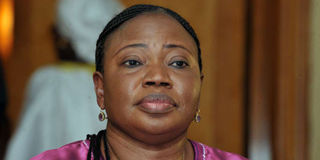Bensouda, Annan tell Africa to stop demonising the ICC

International Criminal Court chief prosecutor Fatou Bensouda gives a press conference on November 12, 2012 in Dakar. Bensouda said the narrative that ICC targeted Africans unfairly should be rejected. PHOTO | SEYLLOU | AFP
What you need to know:
- Bensouda said the narrative that ICC targeted Africans unfairly should be rejected.
- Ugandan President Yoweri Museveni has distinguished himself as one of the fiercest critics of the Hague- based court.
- Annan said African states played a critical role in founding the ICC when he was at the helm of the UN.
- South Africa, Burundi and the Gambia made good their threats by applying for a withdrawal.
MARRAKECH
The sustained attack on the International Criminal Court by the African Union came into focus at the 2017 Mo Ibrahim Foundation annual Governance Weekend in Marrakech, Morocco.
Foundation chairman Mohammed Ibrahim, former UN Secretary-General Kofi Annan and ICC chief prosecutor Fatou Bensouda defended the institution that has become the object of hate by the AU.
Bensouda said the narrative that ICC targeted Africans unfairly should be rejected.
“African leaders choose to ignore how the numerous cases found their way to the ICC in the first place,” she said, disclosing that seven of them were referrals by governments.
The referrals include the one against Uganda’s Lord’s Resistance Army and another against former Cote d’Ivoire President Laurent Gbagbo.
Ugandan President Yoweri Museveni has distinguished himself as one of the fiercest critics of the court.
DEMONISE ICC
Whereas he takes every chance to demonise ICC, he seems at peace with The Hague-based judges trying Ugandan insurgents.
Kenya’s case involving six suspected principal sponsors of the 2007/08 post-election violence was another referral.
The suspects included current President Uhuru Kenyatta and his deputy William Ruto.
The Central African Republic and Mali have also referred cases to the court.
The CAR cases relate to war crimes and crimes against humanity since July 1, 2002, with the peak of the violence in 2002 and 2003.
The Mali case focuses on crimes committed since January 2012, mainly in Gao, Kidal and Timbuktu, with incidents also occurring in Bamako and Sevare.
LOCAL TRIBUNAL
Kenya cases found their way to the ICC when parliament twice voted in the court’s favour. Annan said he waited for MPs to constitute a local tribunal to try the cases, but was left with no option but to hand the envelope containing the names over to ICC.
Bensouda said Cote d’Ivoire was referred to the court even before Abidjan became a signatory to the Rome Statute, “underlying how much faith the continent had in the court”.
“African leaders have no problems with the ICC until it goes after one of them,” she said.
Annan said African states played a critical role in founding the ICC when he was at the helm of the UN.
“Africa constitutes the single largest ICC bloc and the majority of judges are from the continent,” he said.
MASS WITHDRAWAL
He added that the threat of mass withdrawal from the Rome Statute was a myth, since the former was an extension of domestic jurisdictions.
Ibrahim said it was regrettable that leaders had mobilised themselves “into something a kin to a trade union with the purpose of shielding themselves against justice, with total disregard to the victims of their atrocities”.
South Africa, Burundi and the Gambia made good their threats by applying for a withdrawal.
The South African bid has hit a wall after a court declared it null, while the Gambia’s new President Adama Barrow announced his government would abandon the move initiated by predecessor Yahya Jammeh.
Burundi seems to be the last state standing with President Pierre Nkurunziza maintaining a stranglehold on power, having forced his way into a third term.
What the African leaders also ignore is that fact that the court could go after suspects irrespective of whether their countries are Rome Statute signatories or not.




